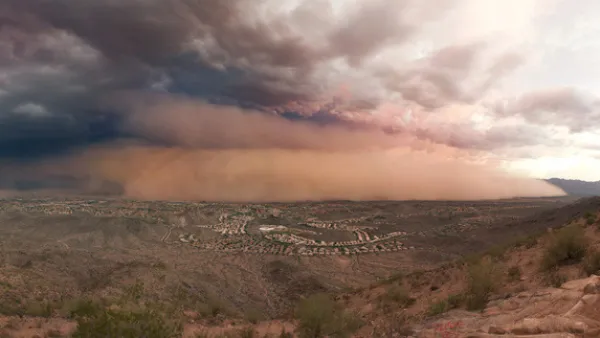In the developed world, increased urbanization can be a net boon for the environment. Yet, writes Bryan Walsh, if not planned for carefully, the rapid urbanization of developing world could have a dramatic impact on climate change and biodiversity.
Walsh summarizes the findings, and recommendations, of a new paper published in the Proceedings of the National Academy of Sciences that outlines the dramatic increase in urban populations and urban land expected globally by 2030, and the potential impact on climate change and biodiversity. In the developed world, increased urbanization can bring environmental benefits such as reduced commutes and reduced household energy use.
However, urbanization in the developing world brings its own set of environmental challenges. As Walsh notes, "in developing nations, the move from
rural areas to cities often leads to an accompanying increase in income -
and that increase in income leads to an increase in the consumption of
food and energy, which in turns produces an uptick in carbon emissions."
Furthermore, as the PNAS paper illustrates, "[t]hose areas of Asia, Africa and parts of South America that will see
urban territory grow most rapidly tend to overlap with biodiversity
hotspots, concentrations of exotic plants and animals. Humans are the ultimate invasive species - when they move into new territory, they often displace the wildlife that was already living there...And as land
is cleared for those new cities - especially in the densely forested
tropics - carbon will be released into the atmosphere as well."
"If we do it the right way, we can mitigate urbanization's impacts on the
environment," concludes Walsh, echoing the findings reported by Karen Seto, a professor of the urban environment at Yale and the lead author of the PNAS paper.
"There is an enormous opportunity here, and a lot of
pressure and responsibility to think about how we urbanize," says Seto. "The one thing that's clear is that we can't build cities the way we
have over the last couple of hundred years. The scale of this transition
won't allow that."
FULL STORY: Urban Planet: How Growing Cities Will Wreck the Environment Unless We Build Them Right

Analysis: Cybertruck Fatality Rate Far Exceeds That of Ford Pinto
The Tesla Cybertruck was recalled seven times last year.

National Parks Layoffs Will Cause Communities to Lose Billions
Thousands of essential park workers were laid off this week, just before the busy spring break season.

Retro-silient?: America’s First “Eco-burb,” The Woodlands Turns 50
A master-planned community north of Houston offers lessons on green infrastructure and resilient design, but falls short of its founder’s lofty affordability and walkability goals.

Test News Post 1
This is a summary

Analysis: Cybertruck Fatality Rate Far Exceeds That of Ford Pinto
The Tesla Cybertruck was recalled seven times last year.

Test News Headline 46
Test for the image on the front page.
Urban Design for Planners 1: Software Tools
This six-course series explores essential urban design concepts using open source software and equips planners with the tools they need to participate fully in the urban design process.
Planning for Universal Design
Learn the tools for implementing Universal Design in planning regulations.
EMC Planning Group, Inc.
Planetizen
Planetizen
Mpact (formerly Rail~Volution)
Great Falls Development Authority, Inc.
HUDs Office of Policy Development and Research
NYU Wagner Graduate School of Public Service


























